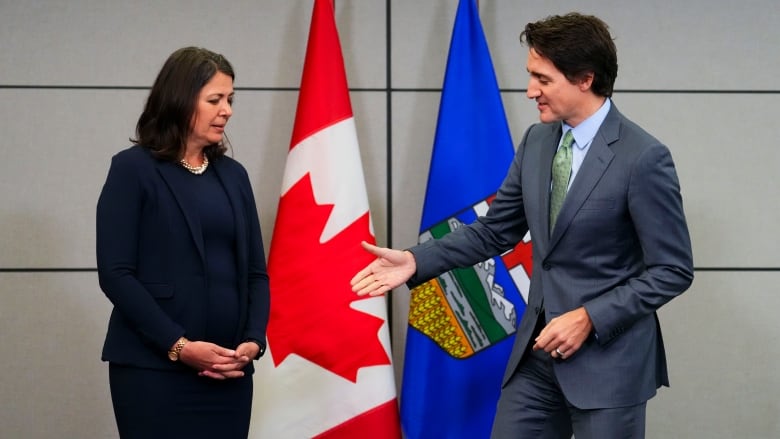Survey suggests Albertans' sense of alienation from Ottawa divided along political lines
Poll finds disenchantment only declining among Alberta NDP supporters

A new survey suggests that some Albertans are feeling less western alienation than in the past few years but mainly justNDP voters.
Results published todaybythe Confederation of Tomorrow survey fromthe non-profit Environics Institute for Survey Research show Albertans' sense of feeling disrespected in confederation and feeling the province receives less than its fair share of federal spending have declined since 2019.
When researchers divided poll results by Albertans' political leanings, executive director Andrew Parkin said they found a growing divide.
"There's two Albertas, and they're going in two very different directions," Parkin said in a Tuesday interview.
University of Alberta political science professorJared Wesley, who does similar research but was not involved in the Environics study, says Albertans experienced a surge in feelings of western alienation after the 2019 federal election.
While Alberta and Saskatchewan voters shut out all Liberal candidates, and Conservatives won the popular vote nationally, the federal Liberals formed a minority government.
Environics has surveyed Canadians since 2019 about their sense of regional alienation. The latest survey of 5,300 people, conducted online in 10 provinces between Jan. 26 and Feb. 9 and by phone in the territories from Jan. 24 to Feb. 26, suggest Newfoundland, Saskatchewan and Nunavut residents felt among the least respected and influential in the country.
The 533 Albertans surveyed were evenly split about whether "Western Canada gets so few benefits from being a part of Canada that they might as well go it on their own," the results suggested.
When they split the Alberta respondents into UCP and NDP supporters, the researchers' results suggested people who back the UCP are still as angry at Ottawa as they were in 2019.

At least 80 per cent of that party's supporters said Alberta isn't treated with the respect it deserves, fails to get its fair share of federal funding, and lacks a fair share of influence on national decisions. Only about four in 10 Alberta NDPbackersseemed to share that sentiment.
The survey began about six weeks after the Alberta legislature passed the Alberta Sovereignty Within a United Canada Act. It purports to allow the legislature to pass a motion, empowering the provincial government to refuse to enforce federal laws or rules it deems unconstitutional or harmful to Alberta's interests.
Since the act passed in December, no MLA has introduced a motion proposing the government use the sovereigntyact.
Parkin said the survey results suggest the sovereignty act didn't relieve the fury UCP supporters felt about the state of federalism.
"They're not taking their foot off the gas just because that act passed," he said.
Results also imply the UCP government may have hit a ceiling in attracting voters by pledging to fight back against Ottawa, since NDP supporters are losing interest in the issue, Parkin said.
Recent public opinion polls show the two parties nearly tied for public support, with the Alberta Party and the Wildrose Independence Party of Alberta trailing far behind.
Wesley says Environics' results mirror his own Alberta survey results through the Common Ground project, funded by the University of Alberta's Kule Institute for Advanced Study.
Those results, published a year ago, suggested the sense of alienation is different between urban and rural dwellers, Wesley said.
Wesley said although a majority of Albertans feel "jilted at the hands of Ottawa," research also shows few of them want to act on those sentiments.
What they want are solutions, including more federal government jobs in western Canada and better representation on the Senate, he said.
Politicians promising to build afirewallaround the provinceare making a mistake, Wesley said.
"[Albertans]don't view politics that way," Wesley said. "They don't like to view their identity as being Albertan or Canadian. Or Alberta first, versus Canadian first."












_(720p).jpg)


 OFFICIAL HD MUSIC VIDEO.jpg)
.jpg)



























































































